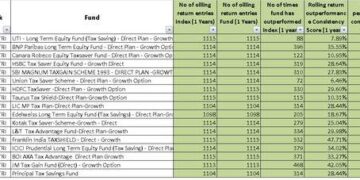
For youngsters, retirement is probably the last thing on their minds. However, even though they have a long way to retirement, it is important that they save for this financial goal as early as possible. This is one big mistake when it comes to retirement planning.
Here are a few such mistakes a young earner must avoid when saving for their retirement.
Also read:How to save for your retirement
- 1. Depending too much on EPF
Many young employees tend to ignore planning for their retirement because of the mandatory savings that happens through their Employees’ Provident Fund (EPF). Remember, EPF is a debt investment and grows at a conservative rate of around 8 per cent a year. To create a sizeable corpus, the growth rate has to take care of inflation over the long term.
Therefore, ignoring classes such as equity, which has the potential of high inflation-adjusted return over the long term, and relying entirely on EPF is not a good idea.
Here is an example to help explain this numerically.
Say you have a basic salary of Rs 3 lakh (Rs 25,000 monthly), the employee contribution of 12 per cent to EPF becomes Rs 3,000, while the employer contributes an equal amount of Rs 3,000. However, 8.33 per cent of the employer’s contribution moves into the Employees’ Pension Scheme (EPS) up to a mandated maximum salary of Rs 15,000, i.e., contribution to EPS is capped at Rs 1,250. The balance of the employer’s contribution (Rs 3,000 minus Rs 1,250) goes into the EPF, i.e., Rs 1,750.
Let’s say you have 30 years to retire and there are no further increments. Assuming an 8 per cent interest rate per annum, the total EPF corpus becomes approximately Rs 70,70,000 (including contributions and interest).
Also read: NPS or retirement funds? Comparison of asset allocation, taxation, cost and liquidity
- 2. Not transferring EPF on changing jobs
The process of EPF transfer has become much easier after the Universal Account Number (UAN) was introduced by the EPFO. However, avoid withdrawing the EPF amount rather, as and when one changes jobs, transfer it online and let the power of compounding help you towards saving for retirement. EPF contributions are from pre-take-home salary and represent the debt component of your retirement portfolio. EPF savings will come in handy in enhancing your retirement corpus, which could include other investments such as PPF and equity mutual funds.
- 3. Starting to save later
If you start saving early, the money required to save for retirement will be much less than the amount you will need to save if you start (saving) at a later age. Saving early has two big advantages: One needs lesser capital to invest and also compounding helps greatly.
Also read: Want to build a big retirement corpus? Start SIPs in equity funds
- 4. Not choosing the right asset class
The choice between equity and debt asset classes will go a long way in determining how much you end up accumulating as your retirement corpus. Studies have shown that equities have the potential to deliver higher inflation-adjusted real return than any other asset class, including gold, debt or real estate, over the long-term. One may have a mix of assets in retirement portfolio, but higher allocation towards equities, ideally through equity diversified funds (both mid and large caps) when the retirement is at least 10 years away is better.
The role of debt assets cannot be undermined in retirement planning. As one nears retirement, debt, being less volatile, helps in preserving the capital. One should start shifting funds from equity to less-volatile debt assets through the process of de-risking as one nears retirement.
- 5. Considering 60 as universal retirement age
As a result of an increase in life expectancy and economic pressure, it is becoming difficult to retire at the age of 60. What one earns and invests during the earning period (of nearly 3 decades) of life is expected to help in sustaining the non-earning period (of nearly 3 decades).
If health issues don’t crop up, individuals tend to take up consultancy jobs to tide over financial concerns as well as keep themselves busy for a few more years after retirement. But not all would ideally want to carry on if there is a decent corpus for retirement.
Also read: Can investing in a property be a good bet for retirement portfolio?
- 6. Not planning for early retirement
Although life expectancy is on the upswing in India, the case for early retirement, even though there is no study to back it, seems to be picking up steam, with many people seriously contemplating it.
For early retirement, one has to have accumulated a big enough corpus so that one does not need to depend on active income anymore. Such a corpus should be able to generate an inflation-adjusted regular stream of income for the rest of the lifetime, without compromising on the standard of living.
- 7. Ignoring inflation
Youngsters, even if they have started saving for the long term, may not have estimated their retirement corpus requirement based on actual numbers. This could lead to a hard landing when retirement nears. A Rs-50,000 monthly household budget may seem reasonable now. But will it remain the same 15-20-30 years from now? Assuming a 5 per cent inflation rate, the actual amount balloons to Rs 1.7 lakh a month, nearly 3.5 times. One, therefore, needs to save towards the latter and not look at current costs.
Inflation brings down the purchasing power of the currency. If one seems comfortable with a crore of corpus, let’s look at its worth or the purchasing power after 15 years at 5 per cent inflation rate: Rs 1 crore will fetch you goods and services worth only about Rs 48 lakh.














